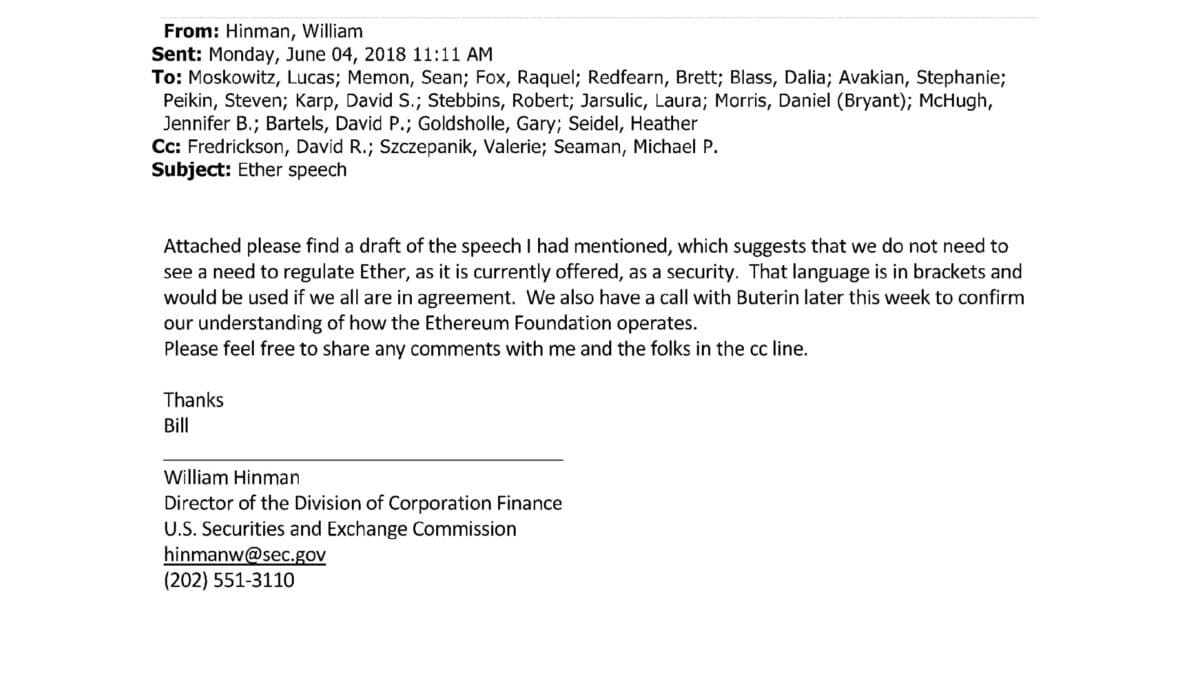Ripple’s Chief Legal Officer, Stuart Alderoty, has called for an investigation into former U.S. Securities and Exchange Commission (SEC) director Bill Hinman. The call comes in the wake of the court-ordered release of a trove of documents by the SEC, which has been embroiled in a legal dispute with Ripple since 2020.
The documents, which were recently unsealed by a judge’s order, reveal conflicting thoughts and opinions within the SEC regarding the regulation of the crypto industry. They largely pertain to a speech delivered by Hinman in June of 2018, in which he stated that Ethereum (ETH) should not be considered a security as it was “sufficiently decentralized.”
13/An investigation must be conducted to understand what or who influenced Hinman, why conflicts (or, at the very least, appearances of conflicts) were ignored, and why the SEC touted the speech knowing that it would create “greater confusion.”
— Stuart Alderoty (@s_alderoty) June 13, 2023
However, Web3 enthusiasts — including several figures involved in ongoing cases with the SEC — view this statement as being at odds with the regulatory body’s later decision to sue Ripple Labs for allegedly selling $1.3 billion worth of XRP as an unregistered security. The documents have caused the wider crypto industry to accuse the SEC of arbitrarily applying securities laws to a range of digital tokens, displaying a marked lack of internal cohesion toward blockchain-enabled technologies and overall being out of touch and unfit to adequately regulate the industry.
Challenging the SEC’s regulatory legitimacy
In a Twitter thread outlining his thoughts on the matter, Alderoty claims that Hinman “invented factors” that should be taken into consideration when determining what “sufficiently decentralized” actually means. He also urged the SEC to remove the speech from its website and initiate an investigation into the former director.
“An investigation must be conducted to understand what or who influenced Hinman, why conflicts (or, at the very least, appearances of conflicts) were ignored, and why the SEC touted the speech knowing that it would create ‘greater confusion,’” Alderoty wrote.

The Ripple legal chief also argued that the unsealed documents, which include emails and other digital documents, show dissent among SEC officials regarding certain aspects of Hinman’s speech and that the director ignored their concerns. Alderoty cited portions of the documents where the body’s Head of Trading and Markets expressed concerns that the extensive list of factors in Hinman’s speech might lead to greater confusion about what constitutes a security.
The significance of the Howey Test
One of the reasons the Web3 community is up in arms about the documents is that Hinman’s comments, along with those made by other SEC staff members, sit in stark contrast to those of SEC Chair Gary Gensler, who has been vocal about how the organization relies on the Howey test to consider the legal categorization of crypto tokens. While Gensler has said that the SEC considers “most crypto tokens” as investment contracts under the Howey Test, claiming that the legal framework already exists with which to consider cryptocurrencies, these new documents reveal figures within the SEC’s own walls are not united in this thinking.
That such dissent and discussion exists even among the SEC’s own staff is perhaps unsurprising; even SEC Commissioner Hester Peirce has long criticized Gensler’s regulation-by-enforcement approach to the industry.
14/ And finally, Hinman’s speech should never again be invoked in any serious discussion about whether a token is or is not a security. Unelected bureaucrats must faithfully apply the law within the constraints of their jurisdiction. They can’t – as Hinman tried – create new law.
— Stuart Alderoty (@s_alderoty) June 13, 2023
Alderoty is far from the only voice critical of the Gensler-led body in what is increasingly starting to look like an all-out regulatory war on crypto; on June 12, GOP lawmakers introduced the SEC Stabilization Act, which calls for the removal of Gensler from the SEC.
As the SEC continues to ramp up legal efforts with the biggest cryptocurrency exchanges in existence, the Ripple case and the subsequent call for an investigation into Hinman’s actions highlight the ongoing debate and confusion surrounding the regulation of the crypto industry.
The debate is far from academic; Crypto.com recently announced it would be closing down its U.S. institutional services, and the venture capital giant Andreessen Horowitz (a16z) has revealed it will be opening a crypto-focused office in the U.K. in the coming months. How these developments eventually play out is likely to have a significant impact on the future of the industry.
Editor’s note: This article was written by an nft now staff member in collaboration with OpenAI’s GPT-4.










